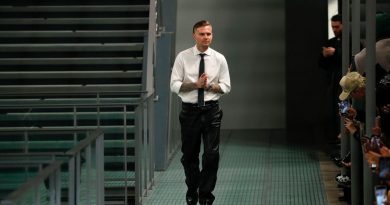Paris Men’s Trade Shows Report Brisk Business – WWD
PARIS — It wasn’t just the city that was crowded during the recent men’s fashion week here; trade show organizers breathed a sigh of relief last weekend as buyers returned to events including Tranoï and Man after two years of scaled-back editions.
“Buyers are not just here, but they are writing orders, including some for first collections, which is rare,” summed up Tranoï chief executive officer Boris Provost. “We’ve seen the return of American, Japanese and South Korean buyers, which is great.”
With positive feedback about its shift toward a more designer-focused positioning, Tranoï, which ran from June 24 to 26, is reaping the rewards of its tie-up with the Fédération de la Haute Couture et de la Mode, signed last year, thanks to synergies with the federation’s Sphere showroom for young designers and its high-traffic location at the Palais de Tokyo.
The show, which highlighted the work of 42 designers — mainly menswear and accessories — ramped up its event program, hosting runway presentations for three labels, LYPH, DenzilPatrick and David Tlale, in the courtyard of the venue. This attracted buyers and press who would not traditionally attend a trade show, Provost said.
The DenzelPatrick presentation at Tranoi.
ALEXANDRE GALLOSi/Courtesy of Tranoi
“People have come back for our third collection,” concurred Daniel Gayle, founder of U.K.-based DenzilPatrick, who is in talks with several major department stores. A second-time exhibitor, he developed a colorful collection exploring identity with lots of quirky references to school life and teenage angst.
“This is our first Tranoi, and it has been better than multibrand showrooms,” said Frederick Edmonson, founder of LYPH. “The big buyers take their time to do the walk-through, and we’ve written orders.”
Over at Man, which returned to its Pavillon Vendôme venue with around 60 labels for three days through June 26, for the first time since the beginning of the pandemic, traffic was brisk and Man/Woman director Antoine Floch said exhibitors and buyers responded well to the scaled-back concept in a single location.
“I recently asked historic exhibitors what they disliked about the most recent pre-pandemic editions of the show, and unanimously, they said it had got too big,” he said. “Around 70 to 80 brands is the sweet spot.”
The show featured a mixture of established labels like Wood Wood, Gitman Vintage and Veja Paris alongside newcomers. “They all hit their objectives by the end of the first day,” Floch said. “People were really happy to be back together again.”
Buyers were shopping for statement styles, observers said. “My store went from mid-high to high-end during COVID-19,” summed up Randy Hoogeweegen, owner of About Lifestyle in Amsterdam. (He is also cofounder of the Ampère brand, featured below.) “People are looking for special pieces, spending much more but keeping items longer,” he said.
Of the direction for men’s collections this season, “There is a more ornamental touch to all the collections, it’s more refined, whereas the last couple of seasons were very bright.”
While the men’s calendar was a trade-show down on January — View, which debuted earlier this year, did not repeat the exercise — there was also a new event in town.
Inside DRP
KIM WEBER/Courtesy of WSN
Staged by Première Classe’s organizer WSN, DRP is a consumer-facing show targeting drop culture, and ran for three days until June 25 at the Grand Palais Ephemère. It integrated footwear forum Sneakerness as well as a selection of streetwear labels, with spaces showcasing new technology including DRP’s own metaverse and Futures Factory, an NFT specialist for the sneaker industry that raised 2.5 million euros in funding last year, as well as a gaming zone, and an area for skate and basketball workshops and competitions that doubled up as a concert space in the evening.
The organizers were expecting 10,000 visitors over the three-day program through June 25, but exhibitors said footfall had been slower than expected, and had been more interesting in terms of business contacts than for sales.
“It’s a lot quieter than expected,” said Anthony Deshoux, founder of the Missive label, which offers streetwear that can be personalized and adapted with Velcro letters and patches. “I’ve made good b-to-b contacts, like a museum that wants to take the line, but I think for the target audience, having to pay to get into an event is a barrier.”
Sneakerness habitué Frank — he declined to give his family name — the owner of German reseller Kixery, bemoaned, “Normally at Sneakerness I would have people queueing, there is no-one here.”
Highlights From the Paris Trade Shows
A look from David Tlale
Alan Marty/Courtesy of David Tlale
David Tlale
Showing at: Tranoï
Category: Ready-to-wear
South African designer David Tlale may be new to showing in Paris, but his opulent gender-fluid label has built a strong following at home over the past 19 years. “Over the years, I’ve been coming to Paris as a tourist, and also sourcing and finding materials and inspiration. And now in 2022, I come here as myself, as a designer. It’s really, really humbling,” he told WWD after his presentation. “Honestly, it’s daunting, because you’re presenting to the heartbeat of fashion, and people look at your signature, and also what you stand for, with a different eye. Yes, I may be celebrated in my country, but coming here, it’s like starting from scratch and rebuilding the brand.” The designer also fosters young creatives through an internship program launched in 2012. “I think I could proudly say the brand David Tlale has introduced about seven solid brands that are currently building and working hard in South Africa. So our brand is not only about just fashion, but it’s really leaving a legacy,” he said.
Pricing: 4,000 to 28,000 South African rand retail, or $250 to $1,760 at current exchange
A look from Llosa
Antoine Guilloteau/courtesy of Llosa
Llosa
Showing at: Tranoï
Category: Menswear
After working as a designer and consultant in the activewear space for 20 years, Fred Llosa decided to combine his expertise with his passion for menswear. “I’m trying to combine the cleanness of tailoring with the flexibility of sportswear,” he explained. With oversize yet structured silhouettes and textured details, he seeks to renew the menswear color palette with dusty, muted pastel shades. After launching the label in 2020 and seeing success with a series of Paris pop-ups, this was his first season opening up for wholesale.
Pricing: 250 euros on average at retail
A look from Ampère
Courtesy of Ampère
Ampère
Showing at: Man
Category: Menswear
Now in its third season, Amsterdam-based Ampère is a high-end men’s label focused on combining embellished details like lace, embroidery and guipure with sportswear silhouettes. “We wanted to make menswear more romantic,” explained cofounder Aleks Kuijpers, a textile specialist who joined with Randy Hoogeweegen, the owner of two About Lifestyle luxury menswear boutiques in Amsterdam, to combine their respective expertise and offer an elevated contemporary wardrobe.
Pricing: 100 to 795 euros retail
A look from Untitled Artworks
Courtesy of Untitled Artworks
Untitled Artworks
Showing at: Man
Category: Streetwear
Graphic designer Erasmo Ciufo has worked with some of the biggest streetwear brands, including Off-White and Adidas. After seeing success with one-off pieces he had created, he decided to launch his own brand, and his first collection introduced in January garnered around 30 stockists, including H.Lorenzo. “I’m humbled by this attention, I’ve always been working in the background for big brands,” he told WWD. With his second wholesale collection, titled “Belonging,” the lineup with a lived-in feel and graphic details was designed to explore shared symbolism and young people’s desire to customize their clothing. Buyers were gravitating to statement pieces in the lineup like outsize knits, he said.
Pricing: 150 to 400 euros retail
A look from LYPH
Courtesy of LYPH
LYPH
Showing at: Tranoï
Category: Streetwear
Pronounced “life” and short for “Live Young Play Hard,” the brand is the brainchild of former Paul Smith designer Frederick Edmonson, based in England’s Lake District. Launched in 2015, the brand uses recycled fabrics and materials and is inspired by popular culture, and is a finalist for this year’s British Fashion Council x GQ Designer Fashion Fund. Its designs are based on utilitarian details with a mix-and-match approach, with snap-on pockets that can be combined with different pieces in the collection or zip-on panels that can be interchanged. There was also a capsule of black-and-white pieces featuring QR codes that link to the brand’s “Therapy Sessions” platform, which offers a library of free wellbeing content.
Pricing: 155 to 680 pounds retail
A look from Isnurh
Courtesy of Isnurh
Isnurh
Showing at: Tranoï
Category: Contemporary menswear
Founded in 2017, sustainably focused label Isnurh, based in Copenhagen, offers a concept combining Scandinavian minimalism with craft influences. With a collection made 60 percent from deadstock fabrics — from an allover terry cloth shirt and joggers with a pastel print to placement details on a trenchcoat, for example — the label is seeing rapid growth thanks to celebrity endorsements, and counts department stores Illum and Magasin du Nord among its stockists in Denmark. The lineup includes Tencel shirts made in partnership with tech company Rodinia printed using an innovative waterless technique with biodegradable inks.
Pricing: 97 to 540 euros retail
A look from De Pino
Courtesy of De Pino
De Pino
Showing at: Tranoï
Category: Ready-to-wear
Paris-based La Cambre graduate Gabriel Figueiredo, who did a stint in Maison Margiela’s embroidery workshop, launched his genderless label in 2020, combining feminine and naive, childlike references in his silhouettes in black and off-white using largely recycled fabrics. With a wardrobe going from elaborate eveningwear — a cape covered in giant 3D daffodils was a standout — through tweed jackets to crochet knitwear and jogging pants, everything is designed to be mixed and matched.
Pricing: 140 to 810 euros direct-to-consumer
Models with a design from A3
A3 Studio
Showing at: DRP
Category: Accessories
Part of the Revibe space at DRP — featuring a selection of labels supported by the French upcycling marketplace — A3 Studio was created by father Adel Haddidi and his son and daughter. The label buys new but unworn sneakers and transforms them into quirky bags, adding chain hardwear, for example. For the moment, everything is done by hand in Paris, but the label is hoping to scale up and work with artisans in Haddidi’s native Kairoun, Tunisia. The brand’s latest venture reuses the soles from the sneakers to create a hybrid with the traditional North African babouche slipper.
Pricing: 250 to 360 euros for bags; footwear (made-to-measure only) 170 to 250 euros.















